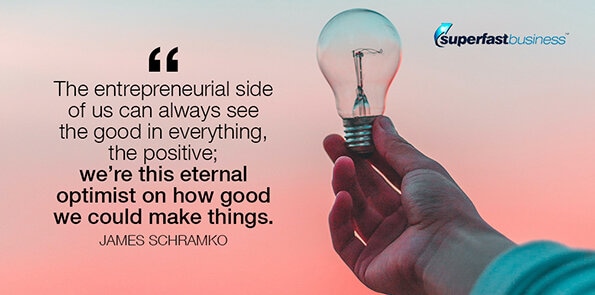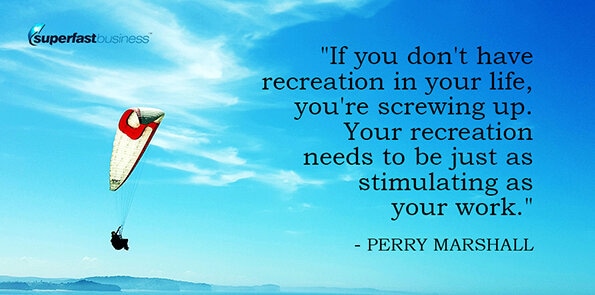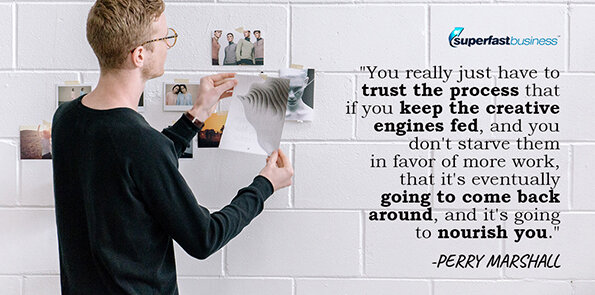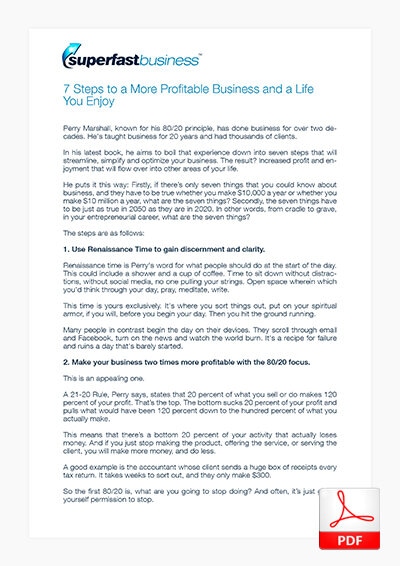This episode’s guest, Perry Marshall, is celebrated for his influential 80/20 sales and marketing strategy. And at the time of this recording, he marks his return to the spotlight with his latest publication, "Detox, Declutter, Dominate: How to Excel by Elimination.”
Perry’s work continues to shape the industry, offering innovative approaches to business efficiency and marketing effectiveness. James himself attributes significant personal and professional growth to Marshall's teachings, especially highlighting the transformative impact of Perry’s AdWords book early in his career.
This inspiration led James to implement paid advertising strategies in his role at a Mercedes-Benz dealership, showcasing the profound influence of Marshall's methodologies.
James also admires Perry's website design and marketing funnel approach as ideal models for converting inquiries into customers.
Podcast: Download (Duration: 40:30 — 37.2MB)
Get Notified Of Future Episodes Apple Podcasts | Spotify | Amazon Music | Android | Blubrry | Gaana | TuneIn | Deezer | Anghami | RSS | More
Table of contents:
1. A very short but weighty book
2. The former complexaholic fesses up
3. Perry’s seven core success principles
- 1 – Do you have your Renaissance Time?
- 2 – Two times the profit using the 80/20
- 3 – Make $1k an hour, at least one hour a day
- 4 – An irresistible product that’s a joy to use
- 5 – Taking a page out of Koch’s book
- 6- Make your business impenetrable
- 7 – You need this kind of freedom
Achieve a business and life you enjoy with help from James
A very short but weighty book
Alongside co-author Robert Skrob, Perry presents a concise but profound publication, a mere 36 pages, challenging popular expectations with its brevity.
Originally a 150-page manuscript, Skrob’s editing distilled the work to an 80% reduced form, emphasizing efficiency and the essence of Marshall’s insights without superfluous content.
Skrob not only trimmed the manuscript significantly but also enhanced it with meaningful graphics, illustrations, and charts to ensure the book’s message was clear and impactful. He aimed to capture the “absolute irreducible essence of planet Perry,” focusing on seven core principles that Marshall believes are essential for business success, regardless of the scale or the era.
The reception to Marshall and Skrob’s unconventional approach has been overwhelmingly positive, with readers appreciating the book’s unique format and distilled wisdom.
Despite its deviation from traditional publishing norms, the book’s clarity, focus, and practicality have resonated with its audience, demonstrating that impactful lessons in business and life need not be lengthy to be effective.
The former complexaholic fesses up
Perry openly shares his journey with James, from being a “complexaholic” to embracing simplicity in his business model, targeting workaholics as the ideal readers of his book. He admits to creating a business that was overly complicated, filled with an abundance of moving parts, employees, products, systems, and ideas—a complexity he once loved.
An intervention by Perry’s brother, the company’s president, marked a turning point, though Perry initially resisted the advice. It took him three months to acknowledge his brother’s wisdom and recognize the need for change, highlighting a challenge entrepreneurs tend to face – letting go of complexity in favor of efficiency and focus.
James reflects on the entrepreneurial tendency to see potential in everything, leading to overcomplication and excessive workload. He stresses the importance of simplification and introspection, especially in light of the recent global changes that have forced individuals to reconsider their business models and lifestyles.

Perry’s concept of “selah,” a biblical term for a pause for contemplation, serves as a metaphor for the current moment of global pause, urging entrepreneurs to use this time wisely to streamline and improve their businesses.
Perry’s seven core success principles
Back on the topic of Perry’s book, Perry goes through his seven steps towards business success.
1 – Do you have your Renaissance Time?
Perry recommends starting one’s day with what he terms “Renaissance time,” a period dedicated to clarity and discernment without the distractions of social media or daily demands.
This practice involves engaging in contemplative activities such as prayer, meditation, and writing, aiming to equip oneself spiritually and mentally before tackling the day’s tasks.
Contrastingly, Marshall critiques the common habit of beginning the day absorbed in electronic devices, social media, and news consumption, arguing that such practices activate stress responses and set a negative tone for the day. He suggests that adopting Renaissance time can fundamentally transform one’s approach to daily challenges, promoting a more productive and centered mindset.
2 – Two times the profit using the 80/20
Perry introduces the concept of significantly enhancing business profitability through the application of the 80/20 rule, focusing on the principle of elimination. He describes the 21-20 Rule, which posits that 20% of business activities generate 120% of profits, while the least productive 20% actually detracts from overall profitability, essentially suggesting that a portion of effort and resources yields negative returns.
To capitalize on this insight, Marshall advises identifying and discontinuing the products, services, or client relationships that result in a net loss. By eliminating these unprofitable activities, businesses can instantly increase their profitability and efficiency.

This approach, giving oneself the permission to cease certain operations, aims at achieving a leaner, more profitable business model.
3 – Make $1k an hour, at least one hour a day
Perry puts forth the goal of earning at least $1,000 an hour for a minimum of one hour each day by utilizing the 80/20 principle effectively.
As an example, he illustrates how a seemingly minor oversight, such as a receptionist at a dentist’s office putting a potential $10,000 client on hold, can result in a substantial loss, equating to $300,000 per hour. This underscores the high value of certain tasks over others.
Perry suggests that investing time and resources into ensuring efficient systems and processes—such as preventing clients from being put on hold—can yield exceptionally high returns, effectively making it a task worth thousands per hour. He introduces a framework categorizing tasks by their hourly value, encouraging the identification and prioritization of high-value activities as a strategy for significantly enhancing productivity and profitability.
4 – An irresistible product that’s a joy to use
By focusing on simplification, step four in Perry’s strategy involves creating an irresistible and enjoyable product or service. James exemplified this by enhancing his onboarding process, tailoring solutions to individual challenges, and introducing an app for his website, which significantly improved customer retention.
Similarly, Mark McShurley’s company, Roofsimple, skyrocketed its revenue by meticulously refining each aspect of the customer’s experience in purchasing a roof, demonstrating the profound impact of simplification and customer satisfaction on business growth.
Roofsimple’s success story, from generating $600,000 in annual revenue to over $10 million within approximately four and a half years, underscores the power of making a service as seamless and pleasant as possible.
McShurley’s dedication to eliminating any inconvenience in the roofing process not only enhanced customer satisfaction but also led to a significant increase in positive online reviews.
This approach has positioned Roofsimple for continued expansion and success in new markets, illustrating that any product or service can be reimagined for the better by focusing on customer experience simplification.
5 – Taking a page out of Koch’s book
Perry advocates for the application of Richard Koch’s Star Principle as a pivotal strategy for business growth, stressing the advantage of being the leading entity in a burgeoning market.
This principle, which posits that the top company in a growing market earns more than all competitors combined, is applicable not just to the business as a whole but also to individual product lines, client segments, and even specific advertising channels.
Perry highlights this approach as one of the most influential for achieving significant profitability and growth.
The Star Principle essentially identifies the small percentage of market players that will command the majority of profits, reinforcing the value of focusing on high-growth areas and securing a dominant position within them.
James notes the principle’s effectiveness in investments, suggesting that those who have applied this insight over the past year could have seen substantial returns, thereby underlining the broad applicability and potential of the Star Principle in various aspects of business and investment strategies.
6 – Make your business impenetrable
Perry’s sixth step involves creating a robust defensive strategy for businesses by leveraging the network effect. This phenomenon enhances a company’s value as more people use its service, as illustrated with platforms like Uber.
In “Detox, Declutter, Dominate,” Perry extends this strategy to businesses of all sizes, suggesting that even smaller companies, such as roofing businesses, can establish their own versions of network effects.
For example, accumulating 300 Google reviews can serve as a formidable “moat” against competitors who have significantly fewer, thereby securing a competitive edge and making the business more resistant to competition.
7 – You need this kind of freedom
Perry concludes his seven-step strategy by discussing the need for freedom to create and reinvent daily. This highlights the two forms of Renaissance Time: reflective and exploratory.
The reflective type is about morning contemplation, while the exploratory type focuses on recreation, which Perry argues is essential for maintaining a balance between work and play. For individuals who are highly driven, engaging in stimulating activities outside of work, like surfing for James, is crucial for overall satisfaction and productivity.

James advocates for the inclusion of recreation in the lives of those he coaches. He questions the value of relentless work if it leads to a lack of meaningful relationships and personal fulfillment.
Perry supports this by suggesting that recreation should not only match but also stimulate the creativity and drive one exhibits in their professional life, creating a fulfilling cycle of work and play.

Perry further explains how a well-integrated recreational life can enrich one’s professional and personal life, turning into a virtuous circle of success and enjoyment. He posits that when recreation is rightly aligned with one’s work ethic and creativity, it not only enhances personal life but also brings about a deeper understanding and enjoyment of work, urging individuals to trust the process of balancing creativity and productivity for a more enriched life.
Discover more about the seven steps in Perry’s book, Detox, Declutter, Dominate: How to Excel by Elimination, by Perry Marshall and Robert Skrob.
Access resources and support to optimize your business inside JamesSchramko membership
Enjoyed the show? Leave us a review on iTunes
Discover more about the seven steps in Perry’s book, Detox, Declutter, Dominate: How to Excel by Elimination, by Perry Marshall and Robert Skrob.
Access resources and support to optimize your business inside JamesSchramko membership
Enjoyed the show? Leave us a review on Apple Podcasts










Leave a Reply